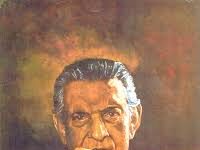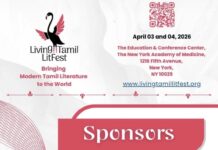
I continue to speak about the importance of preserving our grand festivals. We should not let them turn into mere commercial centres, nor should we politicise them. They should not become arenas for law-and-order issues or be overtaken by unruly elements. These festivals should remain as communal experiences, a shared subconscious that awakens our ancient cultural memories, and act as spaces where history is continually re-lived.
In letters I received for Kumarithuraivi, I noticed many began with, “I am not particularly interested in festivals, but in this novel…”. I have also heard many people talk about festivals with a sense of weariness, viewing them more as entertainment rather than art.
I can understand this immediately because, for a very short period, I was also in that mindset. When I considered myself superior or different, being just one in a crowd felt like an insult. Everytime I couldn’t connect with the masses, I was giving myself extra marks in my mind. Back then, those marks felt very gratifying. Thus, after enjoying all the festivals during my youth, I suddenly became an outsider to all of them.
In my Punaivu Kaliyaatu stories, readers will experience a variety of perspectives on festivals, from the joy of celebration to the emptiness that follows the day after, and the dreamy euphoria of festival mornings among other emotions. Stories like Polivadhum Kalaivadum, Thuli, Vanavasam, Devi, Keli, and ultimately Kumarithuraivi embody these varied moods. However, in my earlier work, Thisaigalin Naduve, one character wanders in isolation, completely detached from the grand festival around him. It was only after experiencing a similar sense of detachment in my own life that I began writing my first story. The journey from Thisaigalin Naduve to Kumarithuraivi marks my evolution as a writer.
Many characters in Vishnupuram are extensions of the solitary figure from Thisaigalin Naduve. These individuals are entirely separated from the crowd, and though at some point they yearn to break free from their intellectual prisons and merge with the masses, they inevitably fail and retreat. They carry an internal furnace, constantly burning, no matter where they go. Today, when I reflect on the characters in Vishnupuram, it feels as though they exist solely within the realm of modern literature, or perhaps modern literature has been written only about them. While there are characters who find contentment in their quest, they often appear as secondary figures compared to the ones who wander alone. Pavagan, Sankarshanan, and Pingalan are such solitary wanderers.
So, when did I return to festivals? It was only through Nithya Chaithanya Yati that I, a young man wandering in search of something, could collect myself and embark on a focused inner journey. My mind, which had been brimming in all directions, found its focus at his feet.
Once I identified what my quest was, I could align myself in all other fields. I no longer needed to display myself anywhere, nor did I require identity or success in any other field. After that realisation, I stopped feeling like an outsider. I could carry myself naturally.
Like a tree dancing to all kinds of winds, a writer must achieve a similar kind of liberation in thought. Upon reaching that point, he will suddenly realise that he is no longer an outsider in any crowd. His boundaries don’t dissolve in the crowd, nor does the crowd dissolve him. Even as he engages fully, there is always an inner flame burning within him, which is why grand celebrations never cause him to lose himself.
This is why I have rediscovered my love for festivals. A festival feels like time layered upon itself, with yesterday-s folding together and suddenly spreading open like a fan, transforming into an immersive experience. What began as a ritual or form of entertainment long ago can be traced back to ancient tribal traditions, far beyond our memory. It has journeyed through the ages, across lands and ownerships, evolving to what we experience today, continually unfolding before our eyes.
A festival is a grand production with thousands of participants, their roles written long before even a hundred generations of their ancestors. Culture has ingrained in them what to say, how to dress, how to celebrate, and what to do, often without them realising it.
It strikes me – nothing in our time compares to the wonder of a festival. Could we even organise something like this today? How many crores of rupees would it take? How many thousands of skilled artists and professionals would be required? Who could possibly write, direct, and conduct such an enormous orchestration?
This great river, shaped by the accumulation of billions of drops, stands as a symbol of cultural identity formed over thousands of years. Its geographical form took millions of years to create. The death of a river signifies the death of a culture–the total loss of a natural wonder. A festival, too, is like a river, born from countless small springs joining into streams, swelling together into the spectacle we witness.
A festival is made of many smaller symbolic events, all interconnected to create a single grand ritual. It enters us visually, audibly, and internally. There is no specific goal we must achieve at a festival. If we surrender our inner selves to the vast interplay of the experience, whatever enters us in that moment becomes ours to keep.
I often view a festival as a grand novel, overflowing with countless people and far more unknown events than familiar ones. Looking back, it feels as if the entire first part of the novel Vishnupuram is steeped in a massive festival, elevating it to a classic. The novel is told through characters who couldn’t fully immerse themselves in the festival, while Kumari Thuraivi recalls it from the perspective of someone who blends into the crowd.
For the modern individual, the best way to approach a festival is simply by deciding to attend. Yet, the first thought for many today is that going to a festival is pointless, a waste of time and energy with no real gain. Instead, they channel their efforts into activities with competition and the promise of victory, believing these to be more valuable. In contrast, a festival seems like a game with no competition. But the beauty of it is that in this game, everyone wins.
At the Aralvaimozhi Tamburan festival, one might see hundreds of young men lifting weights and dancing through the night, their muscles rippling with energy, and think it’s a waste of physical and emotional effort. They might feel disconnected from what they perceive as a “rustic” mindset. However, breaking away from this mentality is key to realising that life isn’t just about accumulating material goods, saving up money, and passing on what’s left.
Those who believe they only use their time and energy in productive ways should pause and reflect on their lives. Think about how we use the resources we earn through our time and labour. A person working ten hours a day for a month might spend the income, roughly a lakh and a quarter, on an Apple phone. For that brief moment of pleasure and a small sense of pride, they work around 250 hours. If you explained this to a young person enjoying themselves at a festival, they would likely think it’s absurd. Yet, we fail to see the absurdity in our own lives.
Spending twenty years in continuous labour without any enjoyment, just to accumulate a few crores to leave behind for our children, is often seen as the most productive way to live. But if we view being happy for just one day as a waste of time or resources, then what does that say about how we have conditioned our minds? In reality, extreme capitalism convinces us that work, earning money, and spending it on consumer goods are the only meaningful activities, and everything else is a waste of time.
The first thing I realised when I started staying in luxury hotels for my work in the film industry was precisely this. Again and again, the middle and upper-middle classes are told to work tirelessly, save without wasting a penny, buy consumer goods, and pass on the rest to their children. We are led to believe this is the only purpose in life. Yet, those at the top of this capitalist system, the ones preaching this to us, don’t live by those rules. They spend most of their days enjoying life, indulging in everything from simple pleasures to high art and fine literature. They truly believe that the rules they impose on others don’t apply to them.
The world they have built tells us that work is the only meaningful part of life, and that our labour is meant to buy the things they sell. They live to enjoy, and we work to sustain them. The social structure accords completely different life principles to palanquin bearers and those seated in the palanquin. Those around us are conditioned to believe that carrying the palanquin is life’s highest pleasure. They have embraced that life, believing in it.
After coming to this realisation, I began speaking about it. You can’t change the entire system overnight, and it’s incredibly difficult to carve out your own path within it. This world has been designed to keep people financially unstable, ensuring that they remain tied to work. At any moment, we could find ourselves stranded, with the looming threat of instability hanging over us. So yes, working, earning, and saving are essential. Never neglect those. But joy and celebration are just as important. Make space for them in your life as much as you can.
I am not advocating for base indulgences. Today, indulgence often equates to drinking to the point of losing consciousness, but such actions only lead to guilt and further misery. What are base pleasures? Who can define them? As a general rule, anything that dulls our intellect and sensitivity can be considered base. On the other hand, anything that sharpens our awareness and brings us genuine joy can be considered elevated. Travel, books, cultural festivals, and artistic events all fall into the category of elevated pleasures, and festivals are among the highest.
Festivals are grand celebrations that encompass many other forms of enjoyment. Even today, large festivals continue to flourish in Tamil Nadu, although many who see themselves as enlightened or advanced remain unaware of them. When you discover these festivals and immerse yourself in them, you experience a deep sense of joy. The belief that you are incapable of experiencing such joy is entirely untrue. No one here is an intellectual trapped in existential despair like Sartre or Heidegger.
Everyone retains the ability to engage, and no one has completely lost the child within. At the Aralvaimozhi festival, I saw seventy- and eighty-year-olds fully immerse themselves in joy, allowing their inner child to emerge naturally. No one ever entirely loses that inner child. The key is identifying the barriers that prevent it from surfacing – once you recognize them, that is all you need.
Most often, that distance is nothing but simple pride or a shallow sense of propriety. If we remove those two things and realise that, with all our qualifications, we are just one among thousands, part of a continuum of thousands who have lived, thrived, and faded away over the past thousand years, we attain a sense of liberation.
Looking at the small village of Aralvaimozhi, I realised that for these ten days, the place has reached an elevated state of joy. During this time, the usual daily concerns don’t exist and there is simply no feeling of tiredness or bitterness. In these ten days, a state of epiphany is achieved by the atmosphere prevalent here. It will ultimately return to its ordinary rhythms, but beneath it all, there will remain a deep feeling–the anticipation for the next festival.
In villages, life itself is marked and divided by festivals. I am amazed when I think of someone who can identify their life’s timeline by festivals; they are living a truly joyful existence. In contrast, I recently spoke with an office worker from Chennai. His past was recalled through crises–floods, protests, elections–events dictated by the media. His entire life seemed to be written by what the news media provided him.
When I look back at my own life some day, I hope to scoop up memories with my palm and savour the sweetness of life.
Translated by Swetha shanmugam











